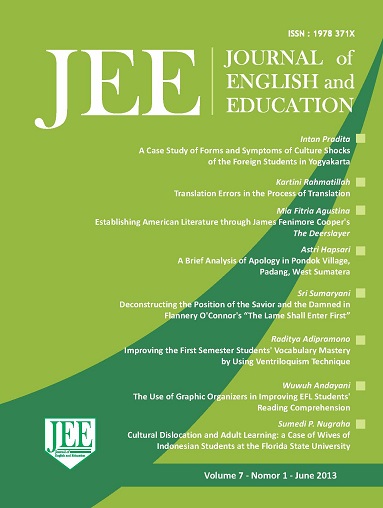Main Article Content
Abstract
Entering multicultural society involves two participants, foreigners and natives. Due to globalization issues, multicultural society are required to have not only a good language competence but also a deep understanding of culture and religious belief. A long process of understading each other force the praticipants to have a good adaptation, which reveals some problems, such as culture shocks and alienation. Moreover, these problems hang on both parties. Therefore, analyzing the symptoms and forms of culture shocks is interesting leading to the way to overcome. One sample of multicultural society grows in Yogyakarta. The number of foreigners aim to study Bahasa Indonesia deal with Yogyakarta people as native Javanese are unique for their inquiries and comments towards Javanese culture. This research shows that although some forms of culture shocks strongly happened, they finally could manage to adapt with some strict normative rules and make friends to Indonesian people.
Keywords: intercultural communication, cultural shocks
Article Details
Copyright (c) 2016 JEE, Journal of English and Education

This work is licensed under a Creative Commons Attribution-ShareAlike 4.0 International License.
Authors who publish with this journal agree to the following terms:
- Authors retain copyright and grant the journal right of first publication with the work simultaneously licensed under a Creative Commons Attribution-ShareAlike 4.0 International License that allows others to share the work with an acknowledgment of the work's authorship and initial publication in this journal.
- Authors are able to enter into separate, additional contractual arrangements for the non-exclusive distribution of the journal's published version of the work (e.g., post it to an institutional repository or publish it in a book), with an acknowledgment of its initial publication in this journal.
- Authors are permitted and encouraged to post their work online (e.g., in institutional repositories or on their website) prior to and during the submission process, as it can lead to productive exchanges, as well as earlier and greater citation of published work (See The Effect of Open Access).

